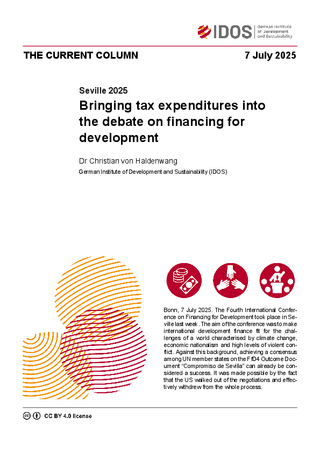Seville 2025
Bringing tax expenditures into the debate on financing for development
von Haldenwang, ChristianThe Current Column (2025)
Bonn: German Institute of Development and Sustainability (IDOS), The Current Column of 7 July 2025
Bonn, 7 July 2025. The Fourth International Conference on Financing for Development took place in Seville last week. The aim of the conference was to make international development finance fit for the challenges of a world characterised by climate change, economic nationalism and high levels of violent conflict. Against this background, achieving a consensus among UN member states on the FfD4 Outcome Document “Compromiso de Sevilla” can already be considered a success. It was made possible by the fact that the US walked out of the negotiations and effectively withdrew from the whole process.
The Outcome Document states that domestic efforts to mobilise additional public resources must be complemented by “inclusive and effective international tax cooperation”. It underlines that cooperation frameworks must address the specific challenges of developing countries. And it pledges to “support and engage constructively” in the ongoing negotiations of the UN Framework Convention on International Tax Cooperation – yet another international reform process the US have withdrawn from this year.
While there is a broad consensus on the key role of domestic revenue mobilisation in development finance, differences appear when it comes to establish shared responsibilities and areas of international cooperation. Major powers insist that taxation should be considered the sole responsibility of national governments, with little space for international coordination on that matter. In contrast, most observers and international organisations agree on taxation not being a purely domestic issue. Tax policies applied in country A often have serious repercussions on revenue, investment and other development indicators in countries B and C.
This is where tax expenditures come in. The term covers the whole universe of tax holidays, reliefs, reduced rates, incentives etc. that governments apply to benefit specific groups, activities or economic sectors. They are used to promote a broad variety of policy objectives such as investment, employment or fighting poverty. However, the existing evidence reveals that tax expenditures are often ineffective in achieving their stated goals. They tend to make tax systems more complicated, more regressive and less transparent. In fact, they can even be counterproductive or harmful, for instance by creating negative externalities and spillovers with regard to other policy objectives and third countries.
In addition, tax expenditures are costly. As a worldwide average, revenue forgone from tax expenditures amounted to 4.2 percent of GDP and 25.7 percent of tax revenue in 2022, according to the Global Tax Expenditures Database (GTED). Real figures are likely to be higher, as underreporting is widespread. More often than not governments do not know the real fiscal costs of the tax expenditures they apply, and even less their positive and negative impacts, because sound evaluations are rare.
Tax expenditures have traditionally been considered an issue governments are supposed to deal with by themselves. This, however, is changing. The FfD4 is the first such conference that explicitly refers to tax expenditures in its Outcome Document. The reference is short but meaningful: “We encourage enhanced oversight and management of tax expenditures, including through transparent tax expenditure reporting”.
So, what needs to be done? A group of international think tanks and NGOs – the International Centre for Tax and Development (ICTD), the International Institute for Sustainable Development (IISD), the Council on Economic Policies (CEP), ODI Global and IDOS – argues that it is time to put tax expenditures on the agenda of international cooperation. As part of the Sevilla Platform for Action we have formed a “Coalition on Tax Expenditure Reform” that seeks to promote the rationalisation of tax expenditures, as a key factor to increase the fiscal space of governments worldwide.
More specifically, the international community needs to take action upon two basic issues:
First, it should agree on minimum standards of public tax expenditure reporting, such as those laid out by the Global Tax Expenditures Transparency Index (GTETI). This means that governments should publish regular reports covering all the tax expenditures they use. They should provide information on the legal basis of the measures, their objectives and intended target groups, as well as the revenue forgone those measures generate. This information should be made available to the parliament and the public in general, linked to the government’s budget proposal. In addition, governments should commit to regular and comprehensive evaluations of the tax expenditures they use, making sure that the results of such evaluations are also published and fed into the policy making process. The idea is to facilitate informed public debate and evidence-based policy-making on this issue.
Second, while tax expenditures are typically set up and operated by national (and, in some cases, subnational) governments, they often impact on third countries. Hence, it is vital to consider them an object of international policy requiring proactive and concrete actions to enhance coordination similar to other elements of national tax policies. Joint standards on tax expenditure reporting, including estimates of revenue forgone, can help protect countries from harmful tax competition through base erosion and profit shifting.


